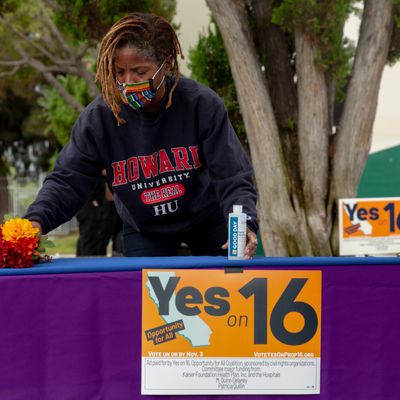
California progressives entered the 2020 election cycle with high hopes for success in the state’s famously expensive and complex landscapes for ballot initiatives. It would be, after all, a high-turnout presidential year with no major statewide races to distract voters — and presumably the effort to eject California’s least-favorite politician, Donald Trump, would drive Democratic participation. So progressives chose 2020 as the right time to push a number of high-priority initiatives they knew would be a tough sell, particularly a long-planned effort to remove commercial property from the assessment and rate protection of the ancient and untouchable Proposition 13 and a drive to revoke an earlier initiative banning affirmative-action preferences in college admissions and state employment and contracting. At the same time, progressives were trying to ward off conservative ballot initiatives cracking down on criminal-justice reforms and, in the most expensive campaign in national ballot-initiative history, exempting “gig workers” from protections and benefits extended to employees.
As it happened, both the “split roll” initiative on commercial property taxes, Prop 15, and the affirmative-action initiative, Prop 16, went down to defeat, as did progressive initiatives expanding local-government rent-control authority, abolishing cash bail, and allowing 17-year-olds to vote in primaries prior to general elections for which they are qualified to vote. Meanwhile, the “gig worker” initiative, Prop 22 — massively financed by Uber, Lyft, Instacart, DoorDash, and other companies utilizing cheap drivers and services — comfortably passed on a wave of misleading ads. All in all, seven of 12 ballot initiatives went down to defeat, with two others still too close to call. And it’s entirely possible a generally negative climate driven by COVID-19 and wildfires alongside voter confusion spiked “no” votes regardless of party or ideology.
But excuses aside, it was a disappointing result for the progressives who in recent years helped Democrats gain supermajorities in both chambers of the state legislature (which they retained on November 3). Perhaps a leading indicator was the surprising failure of a state bond initiative to benefit both K-12 and higher education, which was on the ballot in this year’s March 3 primary, just before the pandemic really hit. But COVID-19 certainly didn’t help: One of the most effective arguments made against Prop 15 was that it was absolutely the wrong time for California to raise taxes on businesses that were generally struggling during a partial shutdown of the economy.
And the general atmosphere of crisis probably did boost “no” votes across the board. Prop 14, authorizing bond proceeds to fund a state institute on stem-cell research, sounded pretty innocuous, but the results are too close to call. The same is true of Prop 19, a veritable Christmas tree of an initiative that hands out real-estate-tax goodies to seniors while closing loopholes benefiting nonresident rich people and also cutting in victims of wildfires. A narrower initiative just focused on seniors barely lost in 2018, without the sweeteners, but this year Prop 19 is too close to call.
The “no” trend helped progressives, however, stop Prop 20, aimed at reclassifying certain criminal sentences as felonies rather than misdemeanors, and didn’t stop passage of Prop 17, restoring voting rights to felons on parole.
It’s unclear at this point whether some of the defeated progressive causes will make a comeback in the near term. Some, like the reinstitution of affirmative-action programs, seem to simply represent a consistently unpopular position.
No one should interpret the 2020 California elections as some sort of triumph for conservatism. Yes, Republicans may claw back a couple of the U.S. House seats they lost in 2018. But Democratic power in the state legislature will be undiminished in 2021. Most important, Joe Biden beat Donald Trump here by better than 30 points, which is why the junior U.S. senator from California is about to become vice-president. But what might have been will haunt Golden State progressives for years to come.






























